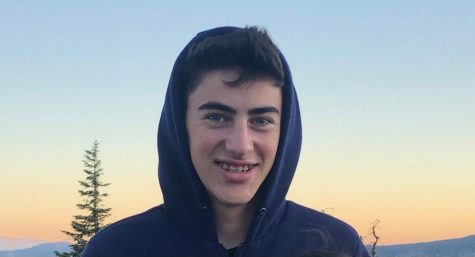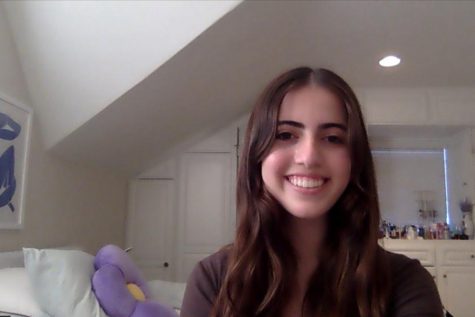VIDEO: Rabbi Segal Looks Back
In an hour-long interview, former Head of School who oversaw building of new campus says he wanted to expand on a school that had started with an ‘amazing idea’
MOVE: Former Head of School Rabbi Ari Segal spoke with Deputy Editor-in-Chief Liad Machmali July 26. His new office as Chief Strategy Officer is where Muriel Ohana’s used to be, and Ms. Ohana has moved into what was Rabbi Block’s office before he took over Rabbi Segal’s position and office.
August 27, 2021
Over his 10 years as Head of School at Shalhevet, Rabbi Ari Segal says he tried to create an institution that allowed for growth in all directions — improving financial stability, increasing the student support program, adopting a new Judaic curriculum or starting entirely new initiatives like the Glouberman Basketball Tournament and Shalhevet Institute.
Rabbi Segal’s family made aliyah to Israel a year ago and now he’s going to join them, though he’ll stay connected to school in a new role as Chief Strategy Officer. His gradual departure was announced in August of 2019.
In an hour-long interview July 26, Rabbi Segal described his biggest accomplishments, his mistakes, and how he’d like to be remembered.
“I think what I did was just take an idea that was a really amazing idea, but needed to be righted financially, mission statement, religiously,” Rabbi Segal said. “There was so much that I think was, not missing, but just needed more.”
The school’s building was perhaps the most visible example. When he arrived in 2011, Shalhevet was housed mostly in a one-story structure that had been converted from a convalescent hospital. It was demolished, a third of the property was sold to the developers of the Vinz apartment complex, and the rest is the three-story Esther and Steven Feder campus that is the school today.
“Our building, that was a part of our financial remodel,” said Rabbi Segal in the interview. “There was a whole new faculty in many ways on the Judaic side. The new curriculum that was put together. We started adding little programs here and there — scholar-in-residence programs and updating different additions to the Student Support program… To me, I’m really proud of that.”
He also mentioned the Shalhevet institute and the Jewish Scholastic Press Association.
He said he had not created these new things himself.
“Almost none of the things I’m describing to you, I did,” he said, “I just tried to build an institution that incubated that.”
In the interview, Rabbi Segal also discussed his goals when he first started, the current condition of the Just Community, what he hoped would be his most lasting legacy and a few of his regrets. He shared some of his favorite moments and what he’d miss most about the Shalhevet community, along with what he hopes it will strive for, and his own plans for the future in Israel.
He said his short-term goal was to stabilize Shalhevet and elucidate what the school stood for, and that his long-term goal had been to improve in all areas.
“For the first few years, my goal was to really define what the school stood for, what Modern Orthodoxy meant, what the value was of giving students a voice — areas that I felt like we needed to expand our offerings from an educational and religious standpoint,” he said.
He recalled that when he arrived, girls were not allowed to have solos in the choir, or sing by themselves at other community events.
“It was always so strange to me, because you had a school that people were saying isn’t following halacha,” or Jewish law, he said. “But the decision to not have them sing I didn’t think persay was following halacha either. It was just sort of like ‘ok, if that’s what Orthodox schools do, we won’t have them sing.’
“So I went and asked a shaila and discussed it with poskim, and I was like no, we’re expanding it,” he said, referring to the process of asking a Jewish legal scholar.
It was one of the first changes he made to school policy.
The Just Community, he said, is also improving, even though it is less active in making policy. Rabbi Segal said there aren’t so many proposals now. He said that was because the school is running well.
“It’s only improving in the sense that, are there people in the school who don’t feel they can be heard? That’s my question of Just Community,” said Rabbi Segal. “Sometimes students are like: ‘The Just Community’s dead because we haven’t had to vote on anything or written any proposals.’ And right — primarily because you have an administration that is running things on time and where they’re supposed to be.
“Often we try to judge things by how much more do we have, how many more proposals do we have, how many more meetings do we have, how much bigger are things, and I think that’s one way of seeing things. That’s like ‘we need more happiness, we need more Just Community.’ But for me, the definition is, are there students who are feeling unseen and unheard and unjustly treated, and I think that that’s less and less. That’s my hope.”
Rabbi Segal hopes that his time as Head of School will continue to help Shalhevet in the years to come.
“Nobody wants to be forgotten,” he said. “I’d like to be remembered as playing some important role in the journey of Shalhevet, Your legacy is just the thing you did — continuing on in a strong way because you contributed to it — so I hope that’s the case.”
For regrets, he believes he lost his temper too often.
“I should’ve realized that I needed just to breathe,” he said. “It didn’t mean that I needed to leave [the room], but I got short-fused.”
Asked when he’d seen the Shalhevet community at its best, Rabbi Segal remembered how it supported a school family after the death of a parent — in this case, Steve Glouberman z”l, after whom the annual basketball tournament was later named.
“I’m sure other communities would do this, but what Shalhevet genuinely is, is we’re a real family,” said Rabbi Segal. “That’s what we believe, and a parent passed away. Every student was going to help out. That’s just an example, meaning I don’t mean that’s more significant than other situations, but it’s like, this is what Shalhevet does.”
Rabbi Segal said he would most miss welcoming students to school in the morning, and also the energy on campus, now that he will be working as Chief Strategy Officer primarily on Zoom as Chief Strategy Officer.
“We just love this,” Rabbi Segal said, referring to himself and his wife, Yoetzet Halacha Atara Segal, who taught Talmud and math during nine years here before moving to Israel.
“We love coming to work everyday. I hope the next job I find has the same thing. I’m helping Rabbi Block out for the next two years but I’m going to be here once a month for a few days. It’s different being on Zoom, you don’t get the same energy.”
Rabbi Segal does not have any specific changes that he would like to see Shalhevet make next, although he does think lowering the cost of tuition would be a nice thing to work towards.
“Affordability as a long-term or mi-term thing is important,” he said. “But LA is just so expensive to live in, so it’s not necessarily on the school. And people are always like: ‘Just cut the tuition’.’ I’m like, Okay, well where are the teachers going to live?”
His future plans are uncertain for now. But he does have some ideas.
“I have a few different ideas, one of which is not starting a Shalhevet in Israel,” he said.
“I’d like to replicate the conversations here that we have — the way we talk about things, the way we dialogue, the way we listen — in a bigger setting. In something more international that shows that what we did here and what we do here is needed and replicable and scalable for the world. I’d like to do something like that. I’d love to find a foundation that needs a head to give out lots of money to things that matter.”















